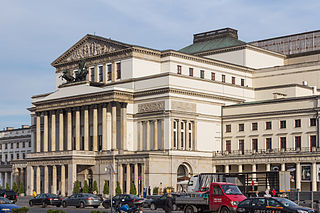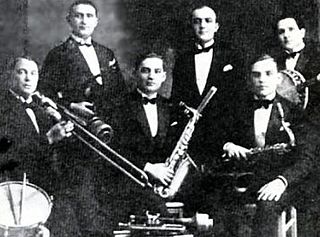
Jan Stefani (c. 1746-1829) was a Polish composer and violinist. [1] [2]

Jan Stefani (c. 1746-1829) was a Polish composer and violinist. [1] [2]
Stefani was born in Prague, and probably studied music there before moving to Italy. [3] Around 1765, he was employed by Franz Joseph, Count Kinsky as a military bandmaster. [3] [4] Also, he would become a violinist at the court of Joseph II.
In Vienna, Prince Andrzej Poniatowski offered him a position in the Polish Royal Court. Stefani accepted, and in 1779 went to Warsaw with a group of musicians. [3] He joined King Stanisław II August's nine-person band, which developed into a court orchestra. In 1795, the Third Partition of Poland caused this orchestra to disband. [5]
For the next four years, Stefani wrote music for St. John's Archcathedral. After Wojciech Bogusławski became director of the National Theatre in 1799, Stefani played with the first violins. He kept this position until 1818. [4]
Stefani died on 23rd February 1829. He is buried in the Powązki Cemetery in Warsaw.
Stefani is renowned for one work, the singspiel Cud mniemany, czyli Krakowiacy i Górale (The Supposed Miracle, or Cracovians and Highlanders), composed in 1794 with a libretto by Bogusławski. The opera is set in Kraków, where the two lovers Stach and Basia, who are prevented from marrying by Basia's stepmother, Dorota. Stach and Basia seek help from Bardos, a physics student, whose initial solution was to use electricity. However, Bardos' growing care for the villagers causes him to abandon the plan. [6] [7]
Other than that, he composed:

Karol Maciej Szymanowski was a Polish composer and pianist. He was a member of the modernist Young Poland movement that flourished in the late 19th and early 20th century.
Jan Dismas Zelenka, baptised Jan Lukáš Zelenka was a Czech composer and musician of the Baroque period. His music is admired for its harmonic inventiveness and mastery of counterpoint.

Józef Antoni Franciszek Elsner was a Polish composer, music teacher, and music theoretician, active mainly in Warsaw. He was one of the first composers in Poland to weave elements of folk music into his works.

Wojciech Romuald Bogusławski was a Polish actor, theater director and playwright of the Polish Enlightenment. He was the director of the National Theatre, Warsaw,, during three distinct periods, as well as establishing a Polish opera. He is considered the "Father of Polish theatre."

The National Theatre in Warsaw, Poland, was founded in 1765, during the Polish Enlightenment, by that country's monarch, Stanisław August Poniatowski. The theatre shares the Grand Theatre complex at the Theatre Square in Warsaw with another national venue, the Poland's National Opera.
Musical nationalism refers to the use of musical ideas or motifs that are identified with a specific country, region, or ethnicity, such as folk tunes and melodies, rhythms, and harmonies inspired by them.

The Warsaw Philharmonic, as it is formally known in English, or Orkiestra Filharmonii Narodowej w Warszawie, as it is legally set up, is a Polish orchestra founded in 1901, one of the nation's oldest musical institutions. Its home is the Warsaw Philharmonic Hall.

Simon Pullman was a Polish violinist, conductor, music teacher and founder and director of the Pullman Ensemble and Orchestra, and a seminal figure in the evolution of chamber music performance.

The Grand Theatre in Warsaw, known in full as the Grand Theatre–National Opera, is a theatre and opera complex situated on the historic Theatre Square in central Warsaw, Poland. The Warsaw Grand Theatre is home to the Polish National Ballet and has a seating capacity of over 2,000.
Józef Kozłowski was a Russian composer of Polish origin.

Karol Kazimierz Kurpiński was a Polish composer, conductor and pedagogue. He was a representative of late classicism and a member of the Warsaw Society of Friends of Learning. He is also known for having composed the music to the 1831 patriotic song La Varsovienne with lyrics by Casimir Delavigne. He was also a mentor and an influence on young Chopin.

Ignacy Feliks Dobrzyński was a Polish pianist and composer. He was the son of Ignacy Dobrzyński, the brother of Edward Dobrzyński, and the father of Bronisław Dobrzyński.

Polish opera may be broadly understood to include operas staged in Poland and works written for foreign stages by Polish composers, as well as opera in the Polish language.
The Chopin University of Music is a musical conservatorium and academy located in central Warsaw, Poland. It is the oldest and largest music school in Poland, and one of the largest in Europe.

Artur (Arthur) Gold was a Polish Jewish violinist and dance-music composer during the Interbellum. He closely collaborated with his brother Henryk Gold and with Jerzy Petersburski with whom he arranged music for his famous ensembles; they were among the most popular composers in interwar Poland and many of their hits were sung throughout the whole country. Gold ran an orchestra in the "Qui Pro Quo" theater (1922) and in the Warsaw "Adria" night club (1931–1939).

Henryk Opieński was a Polish composer, violinist, teacher, administrator and musicologist. His writings on, and collected letters by, Frédéric Chopin, were considered of paramount importance in Chopin studies of the time.

Ignacy Tański was a Polish official, playwright, poet, translator and freemason.
Jiří Čart was a Bohemian composer, violinist and flautist of the late baroque period.
Poverty Made Happy – Polish opera (operetta) in two acts by Maciej Kamieński. Libretto was written by Wojciech Bogusławski, based on a same-named cantata by Franciszek Bohomolec (1777). Its premiere took place on 11 July 1778 in Radziwiłł Palace in Warsaw.

Leopold Borkowski was a Polish actor.